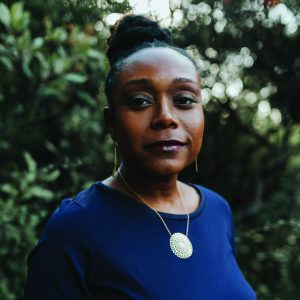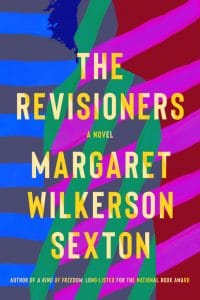The PEN Ten: An Interview with Margaret Wilkerson Sexton
The PEN Ten is PEN America’s weekly interview series. This week, Lily Philpott speaks with Margaret Wilkerson Sexton, author of The Revisioners (Counterpoint, 2019).

Margaret Wilkerson Sexton. Photo by Melissa Schmidt
1. What was the first book or piece of writing that had a profound impact on you?
I remember reading Edwidge Danticat’s Breath, Eyes, Memory when I was in high school and immediately feeling settled in and comforted. There was a way in which Danticat’s voice beckoned to my own burgeoning one and helped it to bloom.
2. How does your writing navigate truth? What is the relationship between truth and fiction?
I like to start every book with a thesis, a message of sorts that I want the reader to take from the story. That thesis has for the last two books centered around social justice, some truth within it that feels imperative to express. For instance, A Kind of Freedom told the story of three generations of a New Orleans family spanning World War II to Post Katrina. The first generation was set in the 40’s in the Jim Crow south and yet that generation was the most stable of the book. As time passed, each descendant declined in some major way, surprisingly, because it would seem that the generation steeped in Jim Crow would necessarily be at the lowest point. The message of the book was that despite the progress we’ve achieved on many levels, there are pockets of the Black community that have regressed largely because systems like the War on Drugs and mass incarceration have come in to do the work of Jim Crow in its wake. Similarly, The Revisioners seeks to explore the historic divide between white women and black women in this country, a divide that recently became notably apparent in the voting patterns observed in the 2016 election.
“When I receive a vision for a book it becomes imperative to me that that vision is realized. I become obsessed with carrying the vision to the stage of realization. It gives me great pleasure to egg it along, it makes me feel like I have a purpose.”
3. What does your creative process look like? How do you maintain momentum and remain inspired?
I write most days for about four hours a day. People ask me how I maintain the discipline all the time, especially in the face of all the rejection I received in the beginning, and I don’t know the answer to that. But I will say that when I receive a vision for a book it becomes imperative to me that that vision is realized. I become obsessed with carrying the vision to the stage of realization. It gives me great pleasure to egg it along, it makes me feel like I have a purpose. So it’s not so much that I need to maintain momentum, it’s more like the idea and the prospect of its completion propel me forward.
 4. What is one book or piece of writing you love that readers might not know about?
4. What is one book or piece of writing you love that readers might not know about?
Into the Go-Slow by Bridgett M. Davis; How to Love a Jamaican by Alexia Arthurs.
5. What is the last book you read? What are you reading next?
I just read The Other Americans by Laila Lalami and am reading Your House Will Pay by Steph Cha.
6. How does your identity shape your writing? How does the history of where you are from affect your identity, and in turn, your writing?
I see everything through the lens of race and color. Much of that has to do with growing up in New Orleans in the ‘80s. I always thought that filter of mine was a burden but it’s helped to guide me toward what I believe is my purpose, telling stories that situate societal issues inside independently compelling plot lines. My hope is that readers will absorb my message without feeling preached to, that they’ll think differently about the themes that pervade the work because they’ve connected with characters who have felt like family for the time they were reading.
7. What advice do you have for young writers?
Be persistent! Rejection is just confirmation that you’re on the right path, and it’s impossible to reach your potential without it. Also, read. If you’re stuck in your own work, read someone else’s. Lastly, activate the editorial part of your mind as much as possible—through writing groups, etc.—so that muscle can be strong when it’s time to apply it to your own work.
8. Which writers working today are you most excited by?
Tayari Jones, Jesmyn Ward, Yaa Gyasi, Jacqueline Woodson, Nicole Dennis-Benn, De’Shawn Charles Winslow, Chanelle Benz, Nafissa Thompson-Spires.
“Be persistent! Rejection is just confirmation that you’re on the right path, and it’s impossible to reach your potential without it.”
9. Which writer, living or dead, would you most like to meet? What would you like to discuss?
I’d like to meet Toni Morrison and discuss her confidence, her sustained ability to trust her own voice, her own vision when people so openly doubted and attempted to negate the value of her work.
10. Your next novel, The Revisioners, is an intergenerational novel that explores the power of family, women’s relationships, and hope. What kinds of research did you do to write this novel? What sources did you draw on, and how did you plot out the through-line of the story through the generations of women it features?
This novel was heavily researched. I read books about farms, books about enslaved people’s escapes, books about lynching, books about sharecropping, books about chain gangs. I always draft a novel in its entirety though before I do serious research. I worry otherwise the research will bog me down. So I knew early on I wanted to draw on two sets of relationships between Black women and white women. The relationships would be separated by a huge span of time, and yet the same disturbing and racist dynamics would be present in each generation. I wrote those two stories and then when I saw the major gaps that existed because, for example, I didn’t know how to grow sugarcane, I began to fill in the gaps.
Margaret Wilkerson Sexton, born and raised in New Orleans, studied creative writing at Dartmouth College and law at UC Berkeley. She was a recipient of the Lombard Fellowship and spent a year in the Dominican Republic working for a civil rights organization and writing. Her debut novel, A Kind of Freedom, was long-listed for the National Book Award, and her work has been nominated for a Pushcart Prize. Her work has been published or is forthcoming in The New York Times Book Review, Oprah.com, Lenny Letter, The Massachusetts Review, Grey Sparrow Journal, and other publications. She lives in the Bay Area, California, with her family.






